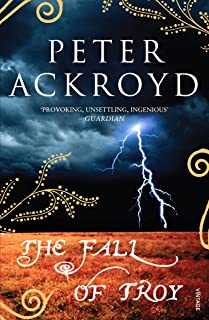Apart from occasional vocabulary that we no longer recognise, John Galt's work reads easily, its tenor remarkably modern, except in matters of race and religion, where a modern interpretation might just confuse. It is important to understand the assumptions of these people in order to understand their work. Yes, Wagner was anti-Semitic, but wasn't everyone else at the time? Rejecting his work on that basis would lead to an equal rejection of other people and institutions that shared the same beliefs, which would automatically include anything to do with Christianity and most writers. Two centuries ago, people did not see the world in the same light and it is through their eyes, not ours, that their work must be seen.
Paradoxically, the Lord Byron was perceived as a Liberal which, at the time, must have placed him in sympathy with at least some of the aims of the French Revolution. This is interesting, given his title, but understandable given his relative penury. He supported the Luddites in Britain, but his domestic political life in the House of Lords was not easy and he was not chosen or perhaps suited for a life in public affairs. His identification with liberal politics is exemplified in this passage from Galt, though it must be noted that at the time liberalism did not extend far into the realm of gender relationships (a cicisbeo is a lover, by the way).
“but young Italian women are not satisfied with good old men, and the venerable Count did not object to her availing herself of the privileges of her country in selecting a cicisbeo; an Italian would have made it quite agreeable: indeed, for some time he winked at our intimacy, but at length made an exception against me, as a foreigner, a heretic, an Englishman, and, what was worse than all, a Liberal.”
His liberalism did extend to the support of liberation movements, however, particularly those in Greece, where still today he is seen by some as a national hero. That is not to say that he was particularly fond of the people.
“Do you know,” said he to the doctor, “I am nearly reconciled to St Paul; for he says there is no difference between the Jews and the Greeks, and I am exactly of the same opinion, for the character of both is equally vile.”
The significance of the above reference to Wagner's anti-Semitism now becomes clear. Perhaps we ought to reject much of Romantic poetry from the canon if we deny Wagner a place. What would be left? Answer – very little...
So what was it that Byron saw worthy of struggle and sacrifice in liberating people for whom he had little respect? The key, which becomes clearer as Galt's biography progresses, is that Byron, like other Romantics, possessed an internal motivation, a personal interpretation whose vivid emotion perhaps raised a screen that was capable of obscuring, even contradicting experience. His response to reality, it seems, is not directly born of the real, but of an idealised knowledge, perhaps pre-formed via education, birth-right and culture, that was more important, at least for the poet, than hard evidence, which could be dismissed or ignored. Galt sums up the process thus.
“that is another and a strong proof too, of what I have been endeavouring to show, that the power of the poet consisted in giving vent to his own feelings, and not, like his great brethren, or even his less, in the invention of situations or of appropriate sentiments”
The author describes how Byron was ambivalent towards the reality of Classical sites, not really showing much interest in the archaeology or the history. Perhaps, via his English public school education, he was au fait with the detail all along and so did not need to absorb direct experience. Perhaps the assumptions of his social class and culture did not admit contradiction of an already internalised ideal that was simply more important than any concrete reality.
Galt's account of Byron's life, however, seems to lack evidence of the hours that the poet devoted to writing. Given that he died in his mid-thirties, spent eight years on the road and did fifteen years in the House of Lords and several years in education, one would expect to find him at work with pen and paper much of the rest of the time. But Galt offers little evidence of this, preferring to concentrate on the travels, themselves, the people he met and the consequences of the complete breakdown in his family and marital relations. But Galt does quote extensively from the poems which, once we absorb the author's analysis that the work is rarely descriptive of anything but the poet's own emotional state, become distinct statements of personality. One feels that Lord Byron was not prone to great self-analysis or soul-searching. He had his opinions, and those were made from granite.
He did campaign for Greece's independence and he did much to achieve what the Greek people wanted at the time. But one feels that for Byron he was working towards the re-establishment of a Classical ideal, a quintessence of democracy that existed longer in school textbooks than it did in ancient Greece. Perhaps "liberal" is too strong a word for Byron... Perhaps "libertarian" would be closer to the modern equivalent. He was for individual freedom, what he saw as the natural order and more democracy, though this probably did not include either women or the lower orders.
How far we have progressed in the last two hundred
years can be judged by the fact that Byron secured both personal fame and
prestige of office in his own time with certain personal characteristics. He
went to public school and Oxbridge, studied ancient Greek, achieved political
status and public fame while being largely ignorant of the scientific advances
of his day, was a libertarian and had distinct failures in both personal and
familial relationships. Couldn't happen now, could it?






